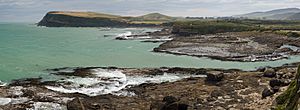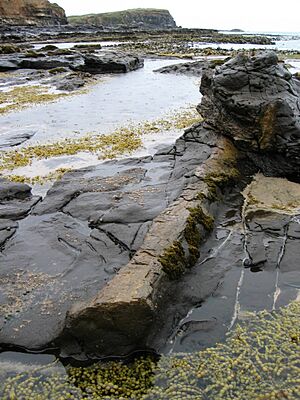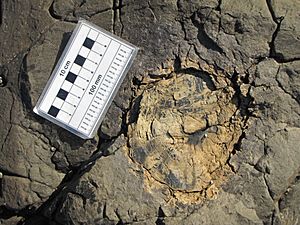Curio Bay facts for kids
Curio Bay is a special place on the coast of New Zealand's Southland District. It's famous for two main things: a super old petrified forest and a home for rare yellow-eyed penguins. This forest is about 180 million years old!
You can also spot Hector's dolphins swimming in the bay, and sometimes even Southern right whales further out at sea. Curio Bay is a big attraction in the Catlins area, drawing around 100,000 visitors every year. If you visit, there's an information center in the nearby town of Waikawa.
Contents
The Amazing Petrified Forest
Imagine trees turning into stone! That's what happened here. The trees were ancient conifers, similar to today's kauri and Norfolk pine trees. Long, long ago, these trees were buried by flows of volcanic mud. Over millions of years, the wood slowly changed into stone as silica replaced the tree material. This process created the amazing fossils you see today.
How the Forest Turned to Stone
The fossil forest grew when the climate was semi-tropical, a long time before grasses and flowering plants even existed. The original forest was full of cycads, conifers, and ferns. It was buried by huge floods of ash and volcanic rock. These floods might have come directly from a volcano or from heavy rain washing down a volcanic mountain.
Scientists can see different layers of fossilized plants in the cliffs. This shows that the forest grew back at least four times between these floods, over about 20,000 years. After that, the area stayed buried for millions of years. During this time, silica slowly soaked into the wood, turning it into stone. This process preserved not just tree stumps and wood, but also fern fronds and leaves!
A Rare Discovery
Fossil forests this old are very rare around the world. Curio Bay has one of the largest and best-preserved ones. The fossilized area stretches for about 20 kilometers (12 miles) from Curio Bay all the way to Slope Point.
Visiting Curio Bay
When the tide is low, you can clearly see the ancient tree stumps and logs. There's a short walkway from the car park that leads to a viewing platform. From here, you can look out over this incredibly important area. It's very important not to damage or take anything from the site.
Images for kids
See also
 In Spanish: Bahía Curio para niños
In Spanish: Bahía Curio para niños






